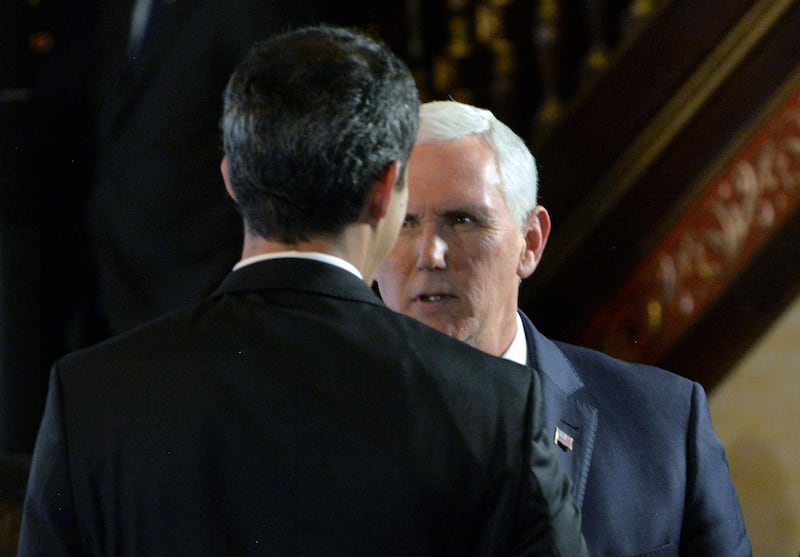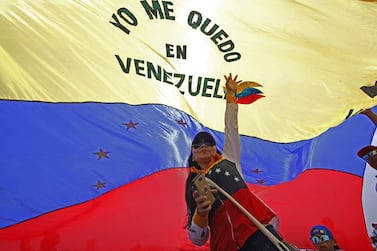US Vice President Mike Pence met with Venezuelan opposition leader Juan Guaido on Monday to discuss how to tighten the noose around President Nicolas Maduro.
The two met with regional allies in Colombia, where Mr Pence announced more sanctions against Venezuela and $56 million (Dh205 million) in aid for Venezuela's neighbouring countries, which for years have been grappling with an influx of people. Some 2.7 million have fled the country since 2015, according to the United Nations.
The US requested an urgent meeting of the UN Security Council and imposed new sanctions on the governors of four Venezuelan states aligned with President Maduro for impeding aid shipments.
Mr Maduro said the meeting was aimed at setting up a parallel government and accused the US of coveting his country's oil and being willing to go to war to get it.
"We hope for a peaceful transition to democracy but President Trump has made it clear: all options are on the table," said Mr Pence, who passed on Trump's "100 percent" support to Mr Guaido.
The meeting came after four people were killed and hundreds injured as Mr Guaido supporters clashed with Venezuelan security forces on the borders with Colombia and Brazil over the weekend in a thwarted bid to bring in humanitarian aid.
The Lima Group – made up of Latin American countries and Canada – met in Bogota and said it would ask the International Criminal Court to declare "the violence of Maduro's criminal regime against the civilian population and the negation of access to international aid as a crime against humanity."
Mr Guaido warned that "indulging" Maduro "would be a threat to all of America," while Colombian President Ivan Duque called for "more powerful and effective" pressure on the socialist leader.
However, the Lima Group rejected the idea of using force to achieve a democratic transition.
The group of 14 nations is ultimately not united in its approach to the Venezuela crisis and Mexico, Costa Rica, Guyana and Saint Lucia skipped the meeting.
"In the Lima Group, the consensus is that Maduro must be removed, but there is no consensus on how to do that," political scientist Laura Gil told AFP.
Back in Caracas a team of six journalists from the US-based TV network Univision said it was detained for nearly three hours on Monday after President Maduro was offended by their questions about poverty and the legitimacy of his rule.
Venezuelan authorities seized the team's equipment, too, said anchorman Jorge Ramos of the big Spanish-language network.
The journalist said he had showed President Maduro footage of children sifting through garbage for something to eat and that Maduro halted the interview and stormed out.
"I had asked him if he was a president or a dictator, because millions of Venezuelans do not consider him the legitimate president," Ramos said.
Mr Guaido, the 35-year-old leader of Venezuela's National Assembly, declared himself acting president in January after the opposition-controlled legislature concluded that Maduro was fraudulently re-elected last year and thus was usurping power.
Some 50 countries recognise him as Venezuela's legitimate interim president.
Despite the defection of more than 270 soldiers to Mr Guaido's side - around 100 of them crossing into Colombia on Monday alone, according to immigration authorities there - President Maduro's military blockade at Venezuela's borders held firm and prevented aid from entering.
Mr Maduro's right-hand man Diosdado Cabello proclaimed "victory" on Sunday.
"Not a single one of those trucks with aid got through," Mr Cabello said at a rally in the border town of Tachira.
Humanitarian aid has become the focal point in Mr Guaido's challenge to President Maduro's authority, as Venezuela suffers from a humanitarian crisis marked by shortages of food and medicine - problems exacerbated by hyperinflation, which has rendered salaries and savings worthless.








